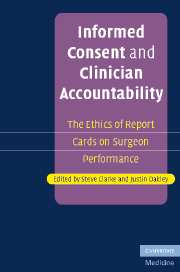Book contents
- Frontmatter
- Contents
- List of contributors
- Acknowledgements
- Introduction: Accountability, informed consent and clinician performance information
- Part I Accountability
- Part II Informed consent
- Part introduction
- 7 Informed consent and surgeons' performance
- 8 The value and practical limits of informed consent
- 9 Against the informed consent argument for surgeon report cards
- 10 Trust and the limits of knowledge
- 11 Surgeons' report cards, heuristics, biases and informed consent
- 12 Report cards, informed consent and market forces
- Part III Reporting performance information
- Index
- References
7 - Informed consent and surgeons' performance
Published online by Cambridge University Press: 08 August 2009
- Frontmatter
- Contents
- List of contributors
- Acknowledgements
- Introduction: Accountability, informed consent and clinician performance information
- Part I Accountability
- Part II Informed consent
- Part introduction
- 7 Informed consent and surgeons' performance
- 8 The value and practical limits of informed consent
- 9 Against the informed consent argument for surgeon report cards
- 10 Trust and the limits of knowledge
- 11 Surgeons' report cards, heuristics, biases and informed consent
- 12 Report cards, informed consent and market forces
- Part III Reporting performance information
- Index
- References
Summary
Risk and disclosure
In order to qualify as an instance of informed consent, a patient's decision to consent to an operation needs to be grounded on an adequate basis of relevant information. Without such a basis of relevant information, a patient's decision to consent to an operation is not an effective informed consent, and is not, therefore, sufficient to authorize that operation. Because many of the categories of information that inform effective decisions by patients to consent to an operation are categories of specialist medical information, patients must rely on the disclosure of such information by medical professionals. A patient must receive an adequate disclosure of a variety of categories of information that are relevant to their decision to undergo an operation, as a precondition to the provision of effective informed consent.
Exactly which categories of information should be disclosed, for the purposes of providing informed consent, is in dispute. What is not disputed by any commentators who accept a doctrine of informed consent is that a necessary component of disclosure, for the purposes of informed consent, is disclosure of the reasonably foreseeable risks of an operation. In this chapter, we argue that disclosures made for the purposes of obtaining patients' informed consent to an operation ought to include material information about a subcategory of risk information: that is, information about the ability of available surgeons to perform the operation in question.
- Type
- Chapter
- Information
- Informed Consent and Clinician AccountabilityThe Ethics of Report Cards on Surgeon Performance, pp. 111 - 133Publisher: Cambridge University PressPrint publication year: 2007



